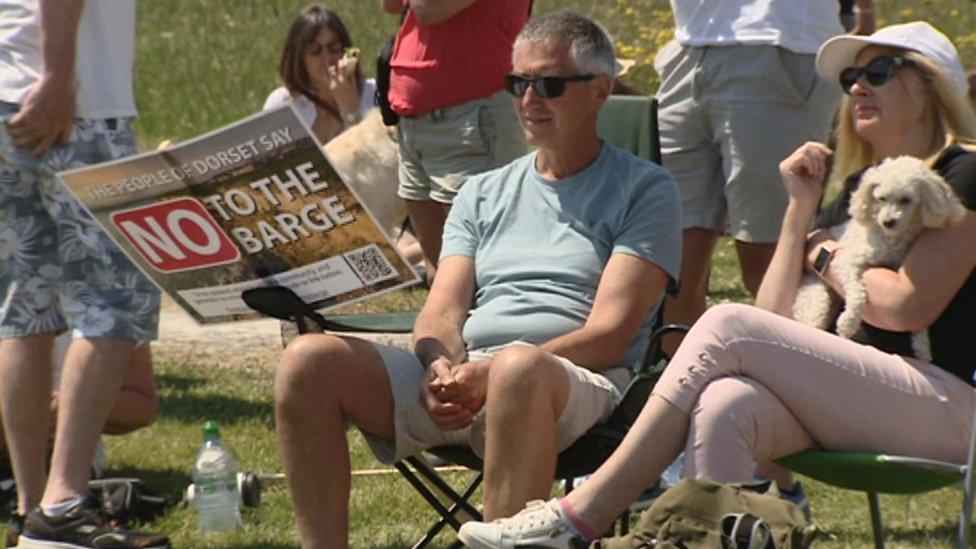Bibby Stockholm: Asylum seekers to be returned to migrant barge
- Published
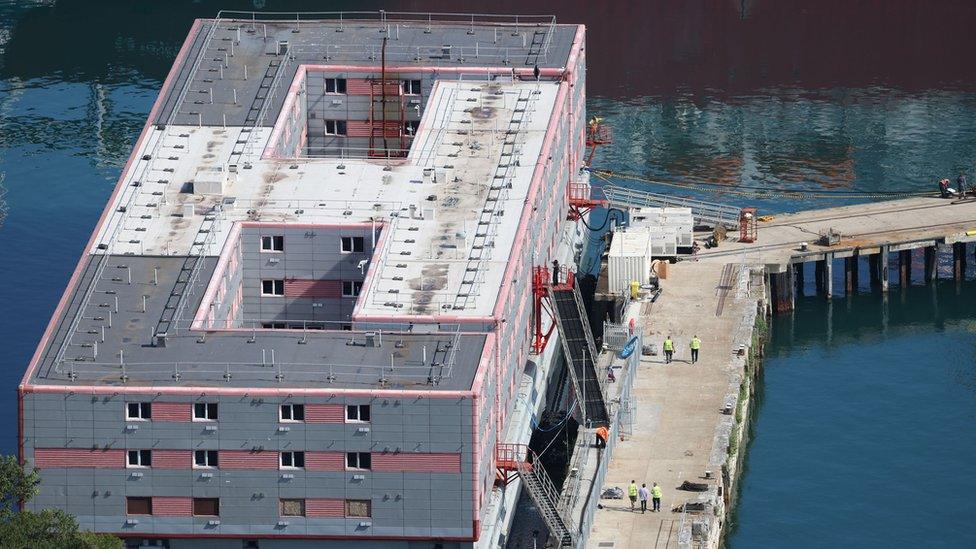
The migrants were removed from the barge after Legionella bacteria was found in the on-board water system
Asylum seekers are being notified that they are to be sent back to a migrant barge off England's south coast next week.
In a statement, the Home Office confirmed they would be moved back on to the Bibby Stockholm "following the vessel completing all necessary tests".
Thirty-nine men were moved on to the vessel in August.
They were later removed when the Legionella bacteria, which can cause serious illness, was detected.
The BBC understands the asylum seekers were given letters from the Home Office on Monday, explaining they would be returned to the barge on 19 October.
In the letter, seen by the BBC, the asylum seekers were told, "you will be required to move to alternative accommodation, and specifically, the Bibby Stockholm barge" and that "this accommodation is offered on a no-choice basis".
It also said that while "this is not detention accommodation" the men would need to "sign in and out of the site when you leave and return" so the Home office can "assure your safety".
The letter also explained they may have to share a room and stated there would be a nurse on board, English classes, recreational space and activities run by volunteers.
Portland Labour councillor Paul Kimber told BBC News he had been informed on Monday that migrants would return to the vessel.
He said: "As you can imagine a lot of the so-called asylum seekers are very, very worried about going on board, with the water contamination."
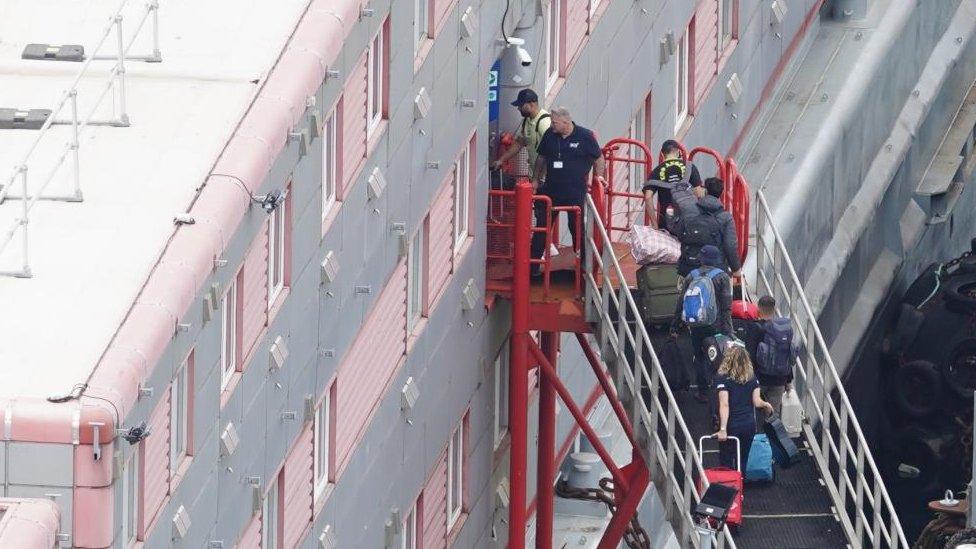
Asylum seekers were placed on board the barge on 7 August but were removed days later after tests revealed Legionella
Mayor of Portland Carralyn Parkes, who also lives on the peninsula, is bringing legal action over the use of the barge after raising more than £25,000 through crowdfunding.
Throughout Tuesday her lawyers and Home Secretary Suella Braverman's legal team argued their case at the High Court, but Mr Justice Holgate has yet to make a decision.
He told the court: "I've had some very skilful submissions on all sides for which I'm grateful and I want to think about what's been said."
The hearing was adjourned until Wednesday.
The three-storey Bibby Stockholm is berthed at the port in Dorset, and is intended to hold about 500 men while they await the outcome of their asylum applications.
The barge is a flagship part of the government's plan to cut the cost of housing asylum seekers and deter dangerous Channel crossings by migrants.
The group of men were briefly housed on the barge before they were taken off when the bacteria was found in the onboard water system.
The Home Office said the letters "confirm the next steps for asylum seekers".
It added: "Delivering alternative accommodation sites, such as the vessel, is more affordable for taxpayers and more manageable for communities, due to healthcare and catering facilities on site, 24/7 security and the purpose-built safe accommodation they provide."
The Home Office said the safety of those on board "remains our utmost priority", adding that it would continue to work with Dorset Council and other local health partners to ensure all health and safety protocols were followed.
"There are well established standard procedures in place which providers are contractually obligated to follow to manage the safety, security and well-being of those they accommodate," it maintained.
Watch: Inside the housing barge after first asylum seekers board
Previously, in an open letter, some of the men expressed "shock and fear" over the discovery of Legionella and said they had faced "isolation and loneliness" since being moved off and housed in a hotel.
The Home Office said at the time it was following all health protocols and advice.
The government previously said there were about 51,000 asylum seekers currently in hotels across the UK - having gone up by 3,000 since the end of March - costing the taxpayer about £6m a day.
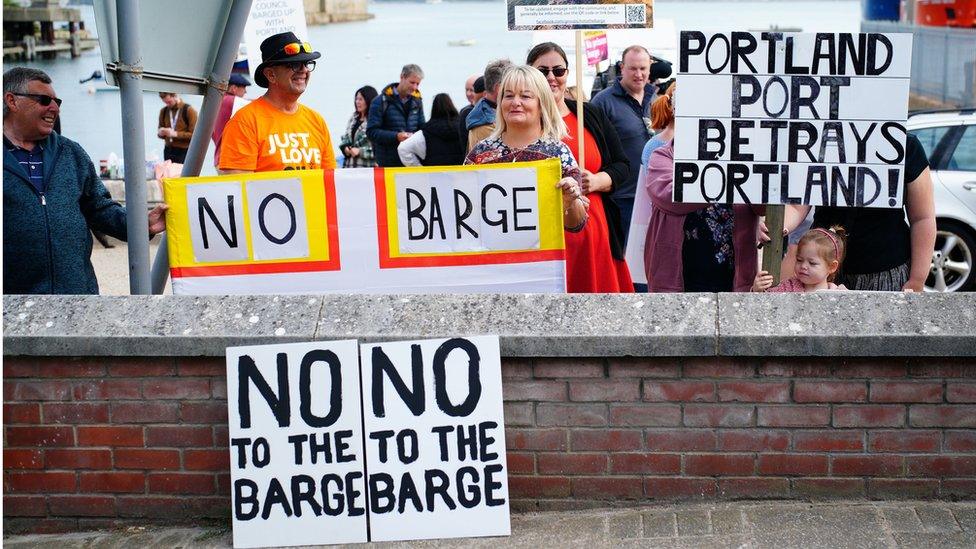
There has been considerable local opposition to the barge coming to Portland
The 222-room barge, chartered by the government for 18 months, arrived at the port in July.
Initially, 15 people successfully boarded the vessel, but a group of about 20 refused to board following legal challenges, refugee charity Care4Calais said at the time.
The barge was previously used to accommodate homeless people and asylum seekers in Germany and the Netherlands.
However, human rights group Amnesty International compared the Bibby Stockholm to "prison hulks from the Victorian era", saying it was an "utterly shameful way to house people who've fled terror, conflict and persecution".
Freedom from Torture, which provides therapeutic care for survivors of torture seeking protection in the UK, previously said the government should stop "forcing refugees to live in unsafe and undignified accommodation".
Before its arrival in Portland, the Archbishop of Canterbury, the Most Reverend Justin Welby, urged the government to pause the scheme for further consultation.
Residents on Portland have also objected, voicing concerns that the local community was not consulted.
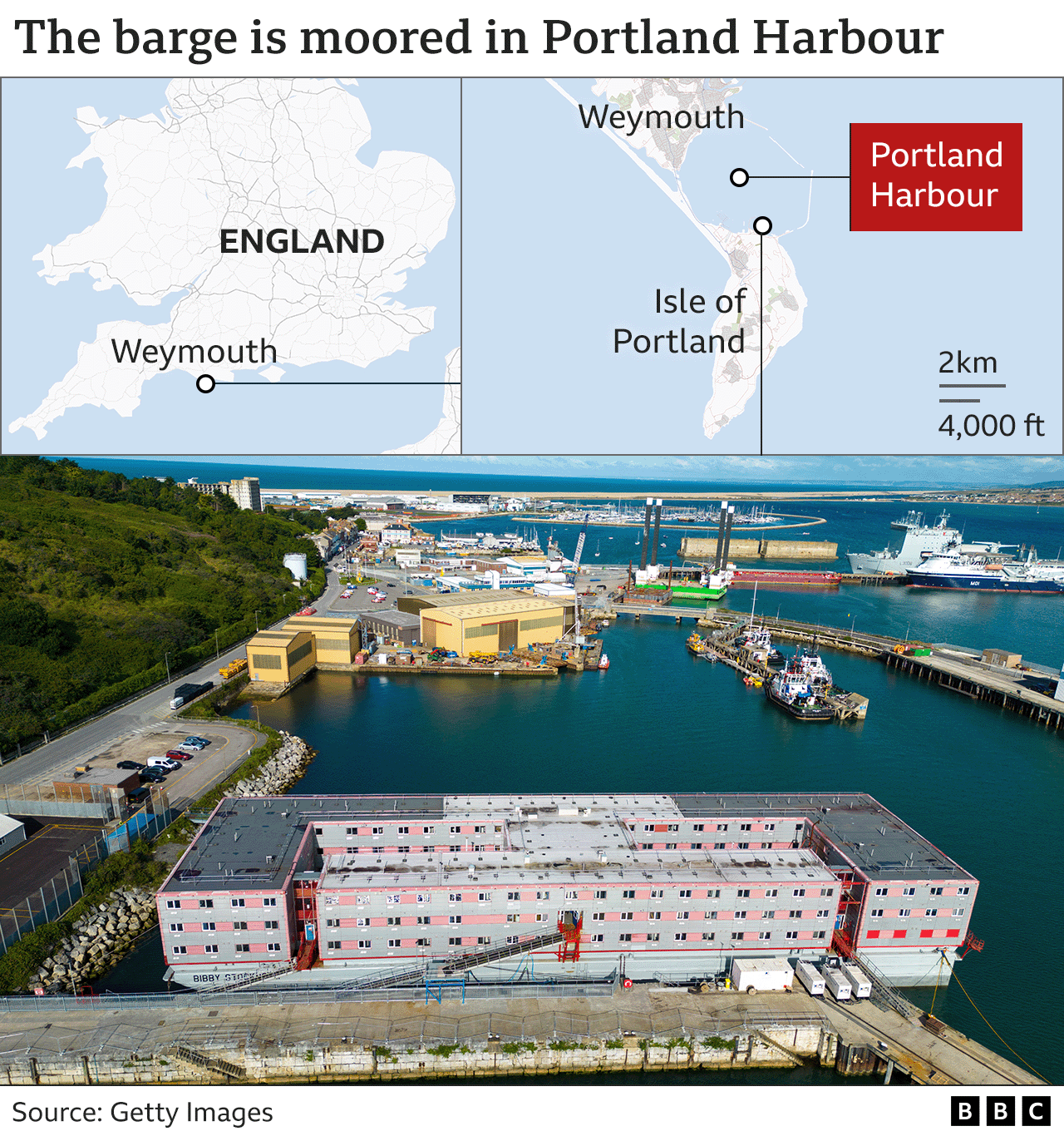

Follow BBC South on Facebook, external, X, external, or Instagram, external. Send your story ideas to south.newsonline@bbc.co.uk.
- Published5 September 2023
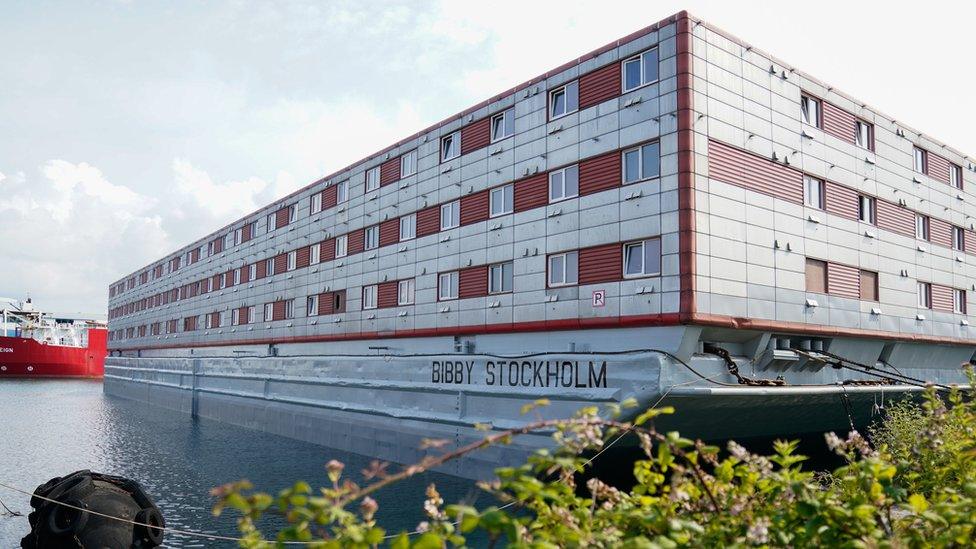
- Published28 August 2023
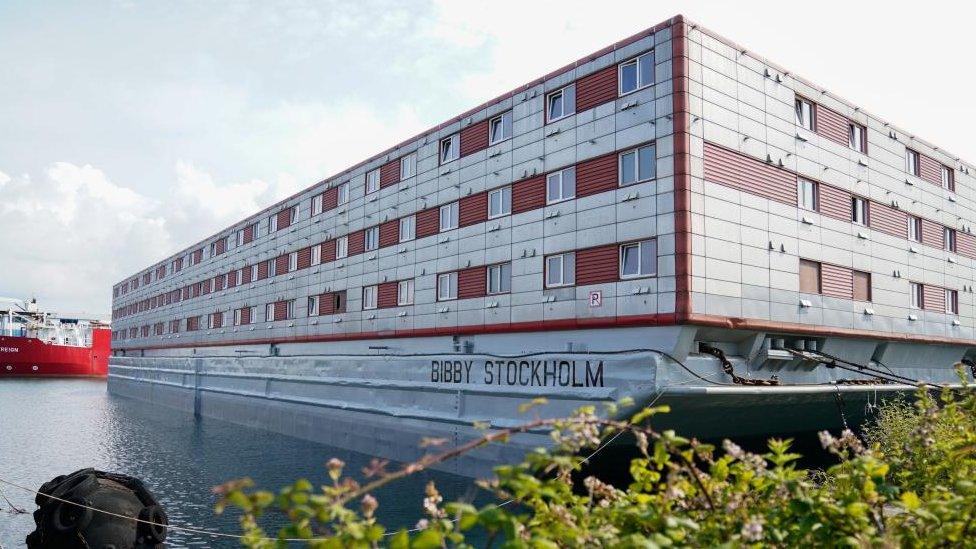
- Published25 August 2023

- Published12 August 2023
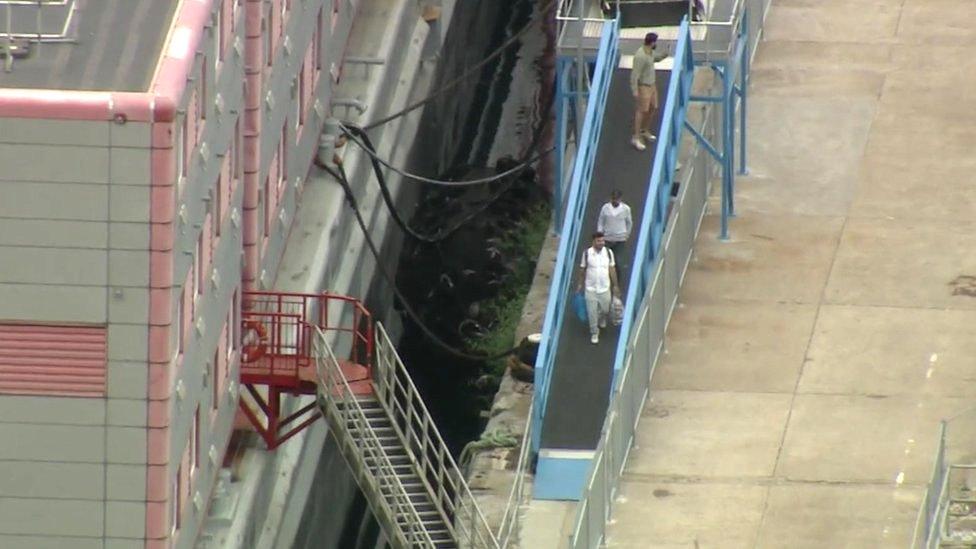
- Published4 June 2023
